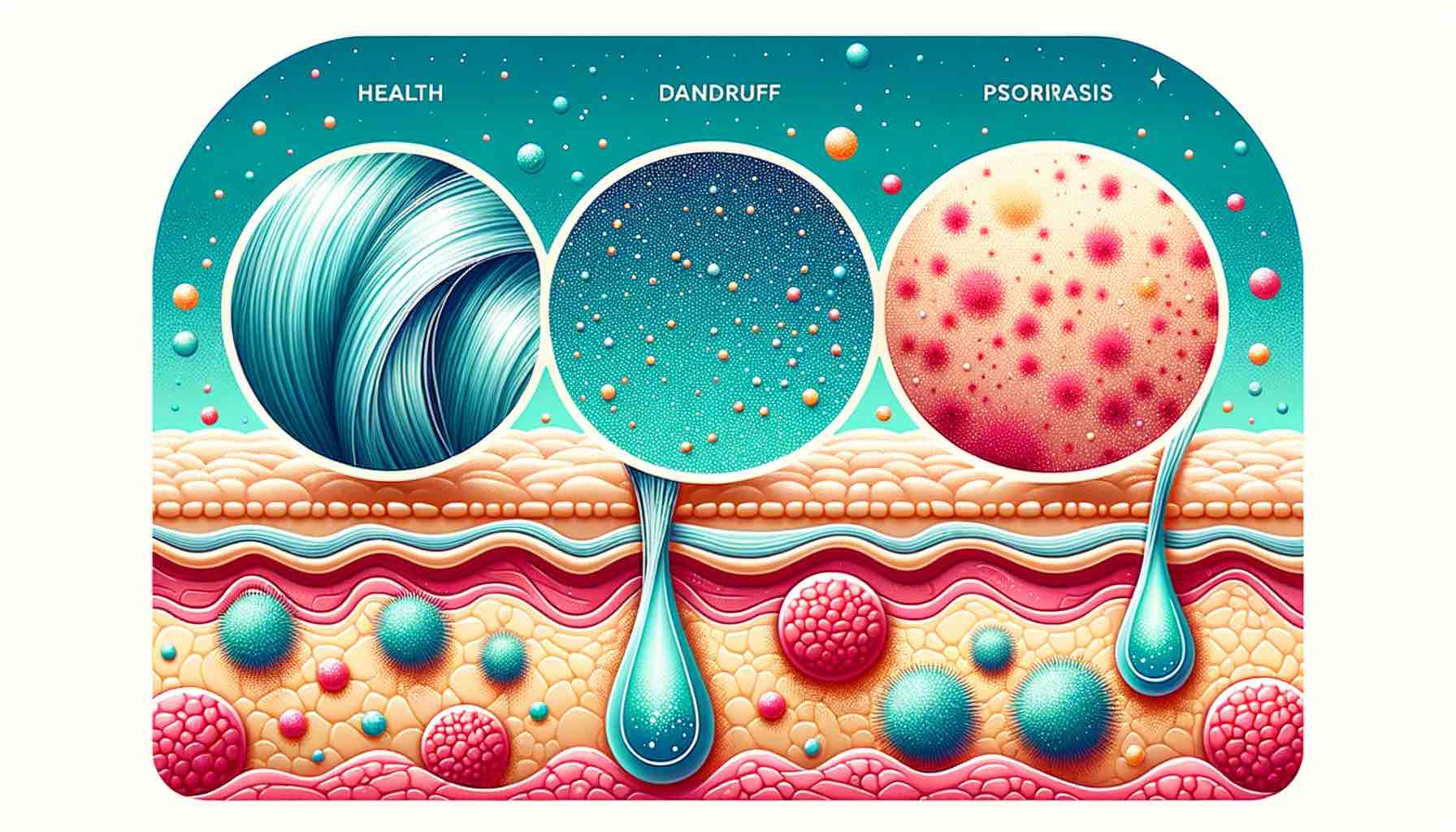
Navigating through the complexities of scalp conditions can be a daunting task. Terms like dandruff and psoriasis often pop up, each carrying its own set of symptoms, causes, and treatment approaches. While they share similarities, such as causing discomfort and flaking on the scalp, dandruff and psoriasis are fundamentally different conditions. Let’s dissect these differences to gain a clearer understanding.
Dandruff: A Common Scalp Condition
Dandruff is a prevalent scalp condition marked by flaking and mild itchiness. It’s generally not serious or contagious but can be embarrassing and challenging to treat.
Symptoms
- Flakes: White flakes of skin that fall from the scalp.
- Itchiness: A constant, mild itch on the scalp.
- Redness and Irritation: The scalp may become slightly red and irritated.
Common Treatments
- Anti-dandruff Shampoos: Shampoos containing ketoconazole, zinc pyrithione, or selenium sulfide.
- Scalp Treatments: Oils and treatments specifically formulated to balance scalp health.
For a more comprehensive understanding of dandruff, consider exploring this detailed guide.
Psoriasis: An Autoimmune Skin Disorder
Psoriasis is an autoimmune condition that results in the rapid buildup of skin cells, causing scaling on the skin’s surface.
Symptoms
- Thick, Red Patches: Often covered with silvery scales.
- Dry Scalp: The scalp may become extremely dry and may even crack and bleed.
- Intense Itching: Psoriasis can cause significant discomfort and itching.
Common Treatments
- Topical Corticosteroids: Widely used for mild to moderate psoriasis.
- Light Therapy: Exposure to natural or artificial ultraviolet light.
Discover more about psoriasis, its manifestations, and ways to manage it here.
Comparing Dandruff and Psoriasis
Appearance
- Dandruff: White, oily-looking flakes of dead skin.
- Psoriasis: Thick, red patches of skin covered with silvery scales.
Affected Areas
- Dandruff: Primarily affects the scalp.
- Psoriasis: Can affect various parts of the body, including elbows, knees, and the scalp.
Severity and Chronic Nature
- Dandruff: Generally mild and manageable.
- Psoriasis: A chronic condition that can range from mild to severe.
Treatment Approaches: A Comparative Look
- Dandruff: Often managed with over-the-counter dandruff shampoos and scalp treatments.
- Psoriasis: May require a combination of treatments, including medicated shampoos, topical solutions, and light therapy.
For a comparative analysis of various treatment approaches, including the efficacy of different shampoos, delve into this insightful article.
Understanding the Triggers
Dandruff
- Oily Scalp: An oily scalp is a common cause of dandruff. It can lead to excess skin cell growth and flaking.
- Sensitivity to Hair Products: Certain hair care products can lead to a reaction, causing dandruff.
- Fungal Growth: Malassezia, a fungus that can grow on the scalp, can also lead to dandruff.
Psoriasis
- Stress: High-stress levels can trigger psoriasis flare-ups.
- Infections: Certain infections can activate the immune system, causing psoriasis symptoms to flare.
- Medications: Some medications are known to trigger psoriasis or worsen existing symptoms.
Management and Lifestyle Adaptations
Dandruff
- Regular Shampooing: Keeping the scalp clean can help in managing dandruff.
- Diet: Consuming a balanced diet rich in zinc, B vitamins, and certain fats may help.
Psoriasis
- Stress Management: Practices like yoga and meditation can be beneficial.
- Skincare: Regular skincare routines using suitable products can help manage symptoms.
For more lifestyle and management tips, you might find this article quite insightful.
Choosing the Right Products
Dandruff
- Shampoos: Look for ingredients like ketoconazole, selenium sulfide, and zinc pyrithione.
- Conditioners: Opt for conditioners that are not too oily and rinse thoroughly.
Psoriasis
- Medicated Shampoos: Shampoos containing coal tar or salicylic acid can be helpful.
- Topical Treatments: Creams and ointments containing corticosteroids or vitamin D.
Explore here for a detailed review of various shampoos and their effectiveness against scalp conditions.
Conclusion: Individualized Approach is Key
Understanding the differences between dandruff and psoriasis is crucial for effective management. While dandruff is more common and often less severe, psoriasis is an autoimmune condition that requires a more comprehensive treatment approach. Tailoring treatments based on individual needs and triggers is essential for managing both conditions effectively.
FAQs
- What are the main differences between dandruff and psoriasis? Dandruff and psoriasis, while both affecting the scalp, have distinct characteristics. Dandruff typically leads to white flakes and an itchy scalp, often due to an oily scalp or sensitivity to hair products. Psoriasis, an autoimmune condition, results in thicker, red patches of skin covered with silvery scales, extending beyond the scalp.
- Can the same shampoo be used for treating both dandruff and psoriasis? Some medicated shampoos can be effective for both conditions, but it’s essential to choose a product based on your specific symptoms and needs. Ingredients like ketoconazole and selenium sulfide are common in dandruff shampoos, while coal tar and salicylic acid are found in psoriasis shampoos.
- How can I distinguish between dandruff and scalp psoriasis? Observing the type of flakes and the affected area can help. Dandruff usually presents as small, white flakes, while psoriasis leads to thicker, silvery scales, and the affected area often extends beyond the hairline.
- Is it necessary to consult a dermatologist for dandruff and psoriasis? For persistent or severe symptoms, consulting a dermatologist is advisable. They can provide a proper diagnosis and a tailored treatment plan, especially crucial for managing psoriasis.
- Can diet influence the severity of dandruff and psoriasis? Diet can play a role. A balanced diet rich in anti-inflammatory foods may help manage the symptoms of both conditions. Specific dietary changes might be more beneficial based on the individual and the condition.
- Are there any natural remedies for managing dandruff and psoriasis? Natural remedies, such as tea tree oil and aloe vera, can offer relief. However, their effectiveness can vary, and they are generally used as complementary treatments.
- How often should someone with dandruff or psoriasis wash their hair? The frequency of hair washing can depend on the severity of the condition and the type of products used. Medicated shampoos might require specific usage instructions to be effective.
- Can stress impact the severity of dandruff and psoriasis? Stress can be a trigger for both conditions, making management strategies like meditation and yoga beneficial for overall symptom control.
- What are the common triggers for dandruff and psoriasis flare-ups? Triggers can include stress, infection, reaction to certain medications, and even weather changes. Identifying personal triggers is crucial for effective management.
- Is it possible to prevent dandruff and psoriasis completely? While complete prevention might not always be feasible, various strategies, including lifestyle modifications and proper skincare routines, can help manage and reduce the frequency of flare-ups.
Blog Tags
dandruff, psoriasis, scalp health, skincare, hair care, dermatology, natural remedies, medicated shampoos, autoimmune conditions, skin inflammation










